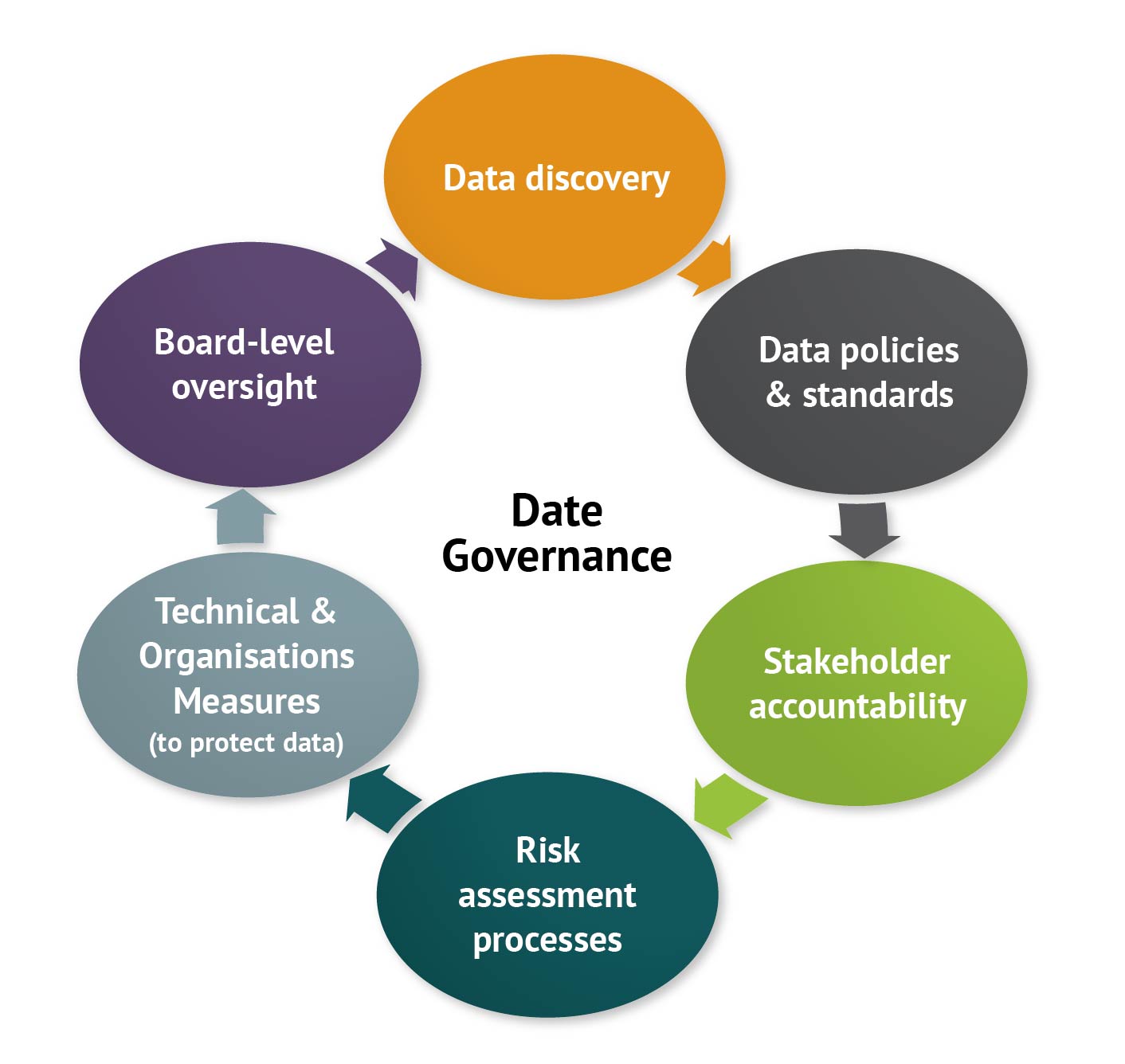Data Governance Quick Guide
Taking control of our data
In essence Data governance is a framework of management practices which makes sure data is used properly in line with our organisational aims, the law and best practice.
Think of it as embedding Data Protection by Design and by Default across the organisation. It means business objectives can be met without taking unnecessary risks with data. Data governance helps us to:
- protect the business and those whose data we process: customers, employees, etc.
- reduce our organisational risk profile
- educate our people, by providing policy & guidance to them on how to use data in the safe and appropriate ways
- build in an ethical approach
- build our reputation, customer trust and enhance the value of our data assets
- support our teams’ innovation with use of data.
The 6 data governance steps
1. Data discovery
It’s vital to identify data assets held across the business understanding how personal data is being gathered, stored, used and shared. It can be helpful to map where the data is located on systems, and document it.
Most medium to large businesses will need to do this anyway to create and maintain an Information Asset Register (IAR) and Records of Processing Activity (RoPA).
2. Policies & standards
If our people don’t know how we expect them to behave when handling other people’s data, we can’t expect them to make a great job of it. Are your policies and procedures all up to scratch? Having a straight-forward, easy to understand and practical Data Protection Policy is a good place to start (alongside relevant training). The importance of well-crafted easy to use policies shouldn’t be underestimated.
3. Stakeholder accountability
We need to identify key stakeholders within the business. Likely to be heads of key functions, such as HR, Operations, Sales & Marketing, and so on.
It’s good to establish data roles and responsibilities, so people are clear what aspects they and others are responsible for. Who has the authority to make decisions about certain data?
4. Risk assessment process
Businesses should have risk assessment procedures to discover, assess, prioritise and take action to mitigate data risks. A governance programme helps teams to identify and assess both existing and emerging risks, so they can be efficiently assessed and mitigated.
Think of data like a balance sheet: it has great potential to create value, but also carries risks and liabilities.
The aim of a data governance programme is to protect both the business and those whose data we process from harm which may arise. For example, things like inaccurate data, unlawful or unfair processing or using people’s data in ways they would not expect or want.
For certain projects it will be necessary to conduct a Data Protection Impact Assessment (DPIA).
5. Technical and organisational measures (TOMs)
Once privacy risks have been identified, we need to consider what measures could be put in place to tackle them. You may choose to mitigate them internally with new procedures or security measures, or perhaps work with a third party to adopt technical or operational measures. Privacy Enhancing Technologies – how they can help
Organisational measures include making sure there’s good awareness about data protection across the business, and employees receive appropriate training.
6. Executive oversight
Risks should be reported up the line to make sure the Senior leadership team has proper oversight and the opportunity to take appropriate action. If your organisation has a Data Protection Officer (DPO) this reporting will be part of the formal accountabilities for their role. But remember not all businesses need to have a DPO. Should we appoint a DPO?
Overcoming cultural challenges
Data protection and privacy professionals face a cultural challenge to win hearts and minds. I have sometimes heard legal or privacy teams described as ‘the department of no’. That’s not how we want to be seen!
Smart businesses are realising the value of taking privacy seriously. We should help our business colleagues to balance the needs of commercial and operational functions with legal & ethical requirements.
We shouldn’t just explain what the law requires. We must go further and help them our colleagues to find practical solutions. Collaboration and mutual understanding are essential ingredients for successful data governance.




